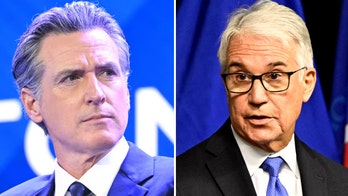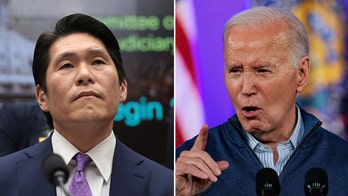The one thing (of many) I love about covering Congress is the sense that you are always learning. Even the members are always learning. Just when you think you have a handle on the Senate rules, for instance, after a decade of doing this, something comes along to challenge that.
That's how it has been with reconciliation, as Democrats appear ever-determined to use the budgetary tactic to shove comprehensive healthcare reform past the GOP filibuster and onto the President's desk.
By now, most people who care about this know that it only takes 51 votes to get a reconciliation bill through the Senate (a simple majority) - no filibusters allowed --- and truly, if the Vice President, in his capacity as President of the Senate, is from the Majority party, as Joe Biden obviously is, the Majority needs only 50 votes for passage, as the Veep can break a tie.
But a new wrinkle has emerged that could throw a stick in the spokes of the Dems' plan for healthcare.
Sen. Judd Gregg, R-NH, who practically has a PhD in the procedure after studying it closely now for about a year (and having used, or tried to use, it on numerous occassions), once Dems made it known they might use the tool on healthcare, says that it is NOT clear Dems can use reconciliation on a product that has not even passed Congress.
Here's the dilemma.
The Senate has passed a healthcare reform bill, the only one likely to stand a chance of passage in Congress, altogether. BUT -- House Dems have balked at some provisions in that bill, like the tax on high cost, or "Cadillac," insurance plans, insisting that changes be made first, before their chamber takes up and passes the Senate bill.
Problem: Senate Majority Leader Harry Reid, D-NV, has lost his 60-vote filibuster-proof majority with the Massachusetts upset that saw GOP Sen. Scott Brown ushered into office. Reid also has a healthy handful of restless Dems in his Caucus who are more than nervous after a number of recent Republican campaign victories, including Brown's.
That means, Reid cannot bring a modified bill back through the chamber under the regular order.
So --- congressional Dems, if they want comprehensive reform, have to go with reconciliation, BUT -- the procedure has strict rules. Put simply, it is meant for things that affect the budget, NOT for creating new policy. There are a whole host of challenges open to the Minority, much of them crafted by the Senate's guardian of the rules: Sen. Robert Byrd, D-WV. And any reconciliation bill must be deficit-neutral in 5 years -- and create NO deficit in any year thereafter. Reconciliation is NOT easy.
Democrats are looking at, instead, creating a reconciliation bill that contains a bunch of legislative fixes for items in the Senate bill that can get past the arbiter of Senate rules, the Parliamentarian, Alan Frumin. They can likely trim down the Cadillac tax, increase subsidies, possibly create a national insurance exchange, BUT --- Democrats will run into some serious problems if they try to mess with abortion and immigration language. Dems have said they will have to put those remaining flashpoint problems in a wholy separate bill, which again raises the specter of a filibuster in the Senate.
And Gregg threw out yet another problem Tuesday --- saying a strong challenge could be mounted against President Obama's newly-introduced plan to create an agency to police the insurance companies, should Dems decide to strick that in their reconciliation bill. Gregg said he has a hard time seeing how that could survive the reconciliation process, as it's much more about policy than about the budget. (Though maybe Dems could put that in a separate bill and get some Republican support down the road.)
Now --- back to that earlier mention of the potential problem, a rather big one, that Dems could be facing.
House Dems are insisting the Senate pass the reconciliation "fixes" bill FIRST -- they want to know Reid can get those fixes approved before they vote through the $871 billion Senate healthcare bill, one they strongly oppose without alterations (because once the House approves it, it goes to the President for his signature).
This puts the legislative "cart" before the legislative "horse". That means, senators would be passing a "fix-it" reconciliation bill for statutes, rule changes, IRS tax codes that don't yet exist. So what would they be fixing?? (See - in the past, Rs rammed through tax cut packages using reconciliation, but then they were just modifiying existing tax code.)
Gregg thinks that cannot be done. But we are in uncharted legislative territory, and the decision on whether or not this is allowed will fall to an unelected official --- the Senate Parliamentarian -- who is about to become very famous, or infamous, as the case may be...
And for the record --- Frumin was first chosen by Republicans, after they fired his predecessor, Robert Dove, in 2001 during a dispute over his rulings over tax legislation (opposition to Dove had been building before that). So, Dems could do the same, though most members I've talked to, on both sides of the aisle, find Frumin eminently fair.
BUT -- it hasnt always been smooth-sailing for Repubs w/ Frumin --- remember this:
Dec. 16, 2009 -- liberal Sen. Bernie Sanders, I-VT, was allowed, by Frumin, to withdraw an amendment he had introduced that would have created a robust public option. Republicans had latched onto it, with Sen. Tom Coburn, R-OK, insisting that the 767-page amendment be read allowed, which ground the Senate to a halt and threatened to derail final passage of healthcare before Christmas. Republicans raged against Frumin, saying the withdrawal of an amendment requires unanimous consent.
GOP Leader Mitch McConnell, R-KY, at the time accused Dems of "somehow" convincing the Parliamentarian "to break with the long-standing precedent and practice of the Senate in the reading of the bill...It’s now clear the Majority is willing to do anything to jam through a 2,000-page bill before the American people or any of us has had a chance to read it — including changing the rules in the middle of the game.”




